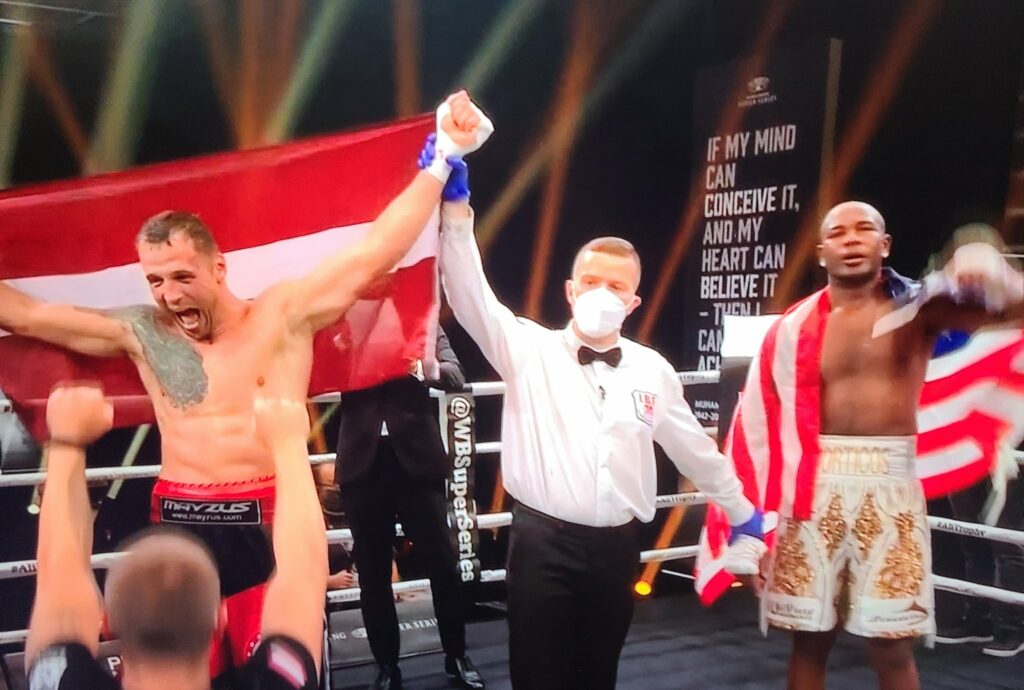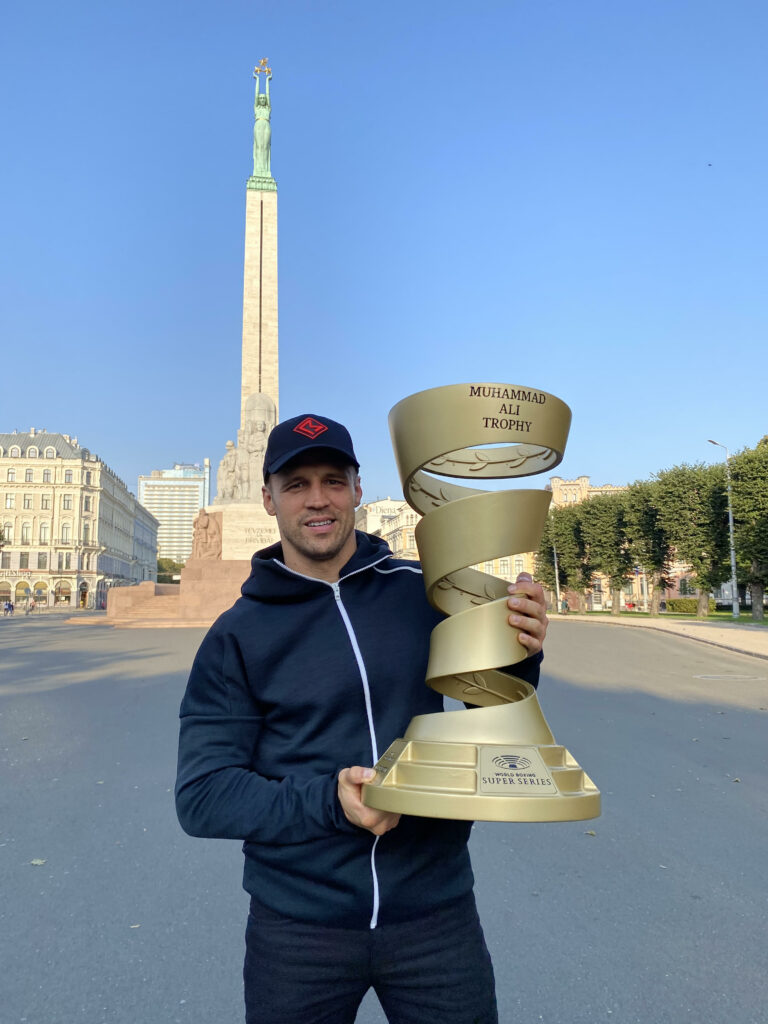King of the cruiserweights Mairis Briedis talks to Boxing Social’s Luke G. Williams about the long road to his WBSS final victory against Yuniel Dorticos, and why a rematch against Oleksandr Usyk could be “the fight of the century”…
“Human nature is to forget everything that went badly or wrong and remember the good things,” Mairis Briedis reflected, as he looked back on the most satisfying fight of his professional boxing career.
The Latvian folk hero admits that the euphoria engendered by his victory against Yuniel Dorticos last month has swept away the memories of 15 months of unremitting frustration.
After his controversial victory against Krzysztof Głowacki in the World Boxing Super Series cruiserweight semi-final in June 2019, Briedis’ showdown with the Cuban power puncher was tentatively scheduled for December 2019.
After being rescheduled for March 2020, the Coronavirus pandemic then struck. A short-lived switch to May proved unworkable and some began to wonder if the tournament would ever be completed at all.
Finally, however, a September 26 date behind closed doors in Munich put an end to the monotony of training and staying sharp without Briedis knowing when he would next fight.
“It was really tough,” the 35-year-old told Boxing Social, his words translated by manager Raimonds Zeps. “It wasn’t just once the fight was moved either. There were always preparations going on and changing for many months. It was very tough for me both physically and mentally.
“For the March date, we had concluded our training and preparations. I had some really tough sparring with guys like Chris Billam-Smith from the UK, who’s a really good prospect. We had no easy days.
“It was dark and cold outside when we were training so that was also tough. But we kept restructuring things so we could face whatever was in front of us. The situation demanded that we show character, which we did.”
The modest Briedis showed much more than character in the ring last Saturday night. Indeed, his performance was a masterclass of aggressive counter-punching, movement and footwork, as he deservedly won the Ali trophy and the IBF and Ring magazine 200lbs belts.
How much the victory means to Briedis – now 27-1 (19 KOs) and surely worthy of consideration for the pound-for-pound top ten – is obvious.
“The dream of probably thousands of professional boxers is something that I can live now,” he said with a smile. “It’s fantastic and makes me very happy. It’s great that I’ve achieved something that will be in the history books. Looking back at all the work I put in, it’s a great feeling that I achieved something so special.
“What this has taught me is that if you have a goal you have to be persistent. Even if you don’t achieve it the first time, you have to stay focused, remember your goal and then you can reach it. It might take you a long time, 10 years maybe or in my case has been 20 years of work to get to this point.”
Back in January, when I last spoke to Briedis, he had given me an insight into the Spartan methods and sacrifices he customarily employs when preparing for a fight.
“The difference between me and many other boxers is that during camp even here in Riga I live with my trainer and my team,” he told me via Facetime, while tucking into a typical post-training session meal of fish, rice, avocado and mozzarella cheese.
“[I’m] away from my family, away from my kids. It’s like an army camp. Getting up early, training, eating, sleeping. It’s the same routine over and over again. No chance for me to see and play with my kids during camp.
“Sundays I have off and that’s the only day I get to see my family but right now one of my kids is sick so I can’t go and see them. It’s a bit like being in the army. As a team we go to church on Sunday, my team are with me and around me every day.”
Refreshingly honest and devoid of some of the tiresome theatrical excesses of gamesmanship and reverse psychology that many boxers employ, Briedis was open from the start about how he would attempt to combat Dorticos and his right hand, a fearsome weapon largely responsible for the Cuban’s impressive record of 22 stoppages from his 24 professional victories.
“We know Dorticos has a really hard punch,” Briedis had pointed out in January. “He’s a very experienced boxer and everyone knows his strengths. Obviously we will be looking for his weaknesses and we will try to avoid his strong sides.
“First of all we are focusing on his punching power. Basically, the focus is on his big punches and avoiding them as much as possible by moving around as much as I can to avoid being hit. All of our work is focused on avoiding his strengths.”
It was a tactical plan that the Latvian never deviated from throughout the long months of waiting that preceded the final.
Even more impressively, at no time during the 12 rounds of combat last Saturday, were any of the frustrations of the past 15 months of waiting and training, training and waiting, evident.

Briedis’ focused display of skill, power and ringcraft was justly rewarded on two scorecards by accurate scores of 117-111 in his favour (the third card of 114-114 was, frankly, absurd and is best ignored).
“Yes, the tactics were to defend against his right hand so he would use it as minimally as possible and couldn’t land anything with it,” Briedis confirmed with satisfaction when reflecting on his performance. “His right hand is his biggest attribute. Our tactic was to move around as much as possible – everyone knows it’s easier to hit a standing target, whether you’re shooting or in a sport like boxing.
“We were planning to attack and counter punch at exactly the eight moment when he was attacking. I would assess my performance at about 50 per cent. My corner and my coach were always telling me to stay back, not take any risks because he is very dangerous. We played it safe.”
Briedis is already a huge hero in his Latvian homeland, but his fame will now hit even greater heights among the proud Baltic nation of almost two million inhabitants.
Back in 2017, he was awarded one of the country’s highest state honours – the Order of the Three Stars Class III. As well as his ring exploits, his work as a policeman in Riga over many years, coupled with his determination to be a suitable role model for Latvian youngsters, has won him widespread admiration and devotion.

here at Riga’s iconic ‘Freedom Monument’ with the WBSS Trophy. Photo: Raimonds Zeps.
Briedis has spoken in the past of a “code of behaviour” that he expects himself and his supporters to adhere to and the high expectations he holds for himself and others.
The support he receives in Latvia, as a consequence, gives new meaning to the term ‘fervent’. I know of at least two British boxing writers who insist the atmosphere created by the Riga fans when Briedis faced Oleksandr Usyk in January 2018 was the best they have ever experienced at a prize fight.
It’s no wonder that Briedis – whose often serious demeanour occasionally masks just what a warm and witty personality he possesses – has referred to his supporters as his “legal doping”.
Due to the Coronavirus restrictions, Briedis was deprived of the chance to contest the WBSS final on Latvian soil, or parade his newly won belts and the Ali trophy through the streets of Riga on his return from Munich.
However, in a hugely symbolic gesture, one of the first places he visited on his return to his homeland was the Freedom Monument, an imposing and implacable 42-metre high structure which honours the soldiers who were killed during the Latvian War of Independence (1918-1920).
“It’s probably our most iconic place in Latvia,” pointed out Briedis’ manager Raimonds Zeps.
As he stood in the shadow of the structure – which is topped by a statue of Liberty, her arms aloft, holding three gilded stars, a triumphant pose mirrored by the boxer when he lifted the Ali trophy – Briedis admitted that he is still to process exactly what the victory means for him and his country.
“I don’t think I, or the people around me, really understand yet what I have achieved,” he pondered. “It will take some time to understand what the trophy is about and what being lineal champion means. For Latvians and for me it’s still something we need to grasp and understand what a great achievement it is.”
However, it is not an achievement that Briedis sees as his swansong.
“I feel good. I definitely want to keep on going,” he emphasised, “I’ll discuss with my promoters Sauerland, we’ll look at the options and see what’s on the table and make the right decision after talking to my family, consulting with my coach and my team and doing the right thing.
“But I feel very good right now and don’t want to end my journey here. You’re not going to get rid of me too soon. We’re still going to chat more times!
One attractive option would be a rematch against his old foe Usyk – who he came within a whisker of beating in a WBSS Season 1 classic. One judge scored the fight a draw, the other two gave it to the Ukrainian by a round. Ringside observers were split.
Usyk now campaigns at heavyweight, of course, which would be no issue for Briedis, who fought six of his first ten pro fights in the unlimited weight class. “That rematch could possibly be the fight of the century,” Briedis said. “I have a different team now. I changed it after the Usyk fight. Looking back that change was needed and it was for the better. I’m very confident in my new coach [Dmitrijs Šiholajs]. I think he’s the number two boxing coach in the world, only behind [Anatoly] Lomachenko.”
Another ambition Briedis harbours is to have a big fight in the UK, where his twin sons from a previous relationship live and “speak Latvian with an English accent”.
“You have to remember that there are a lot of Latvians living in the UK. This fight [against Dorticos] was on Sky Sports. The British media got to see it and showed interest in it. I would love one day to have a magical and really big fight in the UK,” he said.
“That would be awesome for me. The British fans would see how much the Latvian fans bring and how bananas they go. Maybe that would also help some local UK fans to cheer for me, too!”
Briedis’ desire to fight in the UK has been fuelled by his previous appearance on these shores – when he defeated Simon Vallily on the undercard of Tony Bellew’s WBC cruiserweight title defence against BJ Flores at the Echo Arena, Liverpool in October 2016.
“I really enjoyed the atmosphere,” Briedis enthused, at which point his serious mask drops and he breaks into a vocal rendition, not of the Z Cars theme, but of another song played that heady night on Merseyside – Seven Nation Army by The White Stripes.
“I’ve been learning guitar now for a year and I’ve already learned how to play it,” he explained.
Perhaps, I suggest, he could play the guitar himself while making his own ring entrance.
The serious mask returns as Briedis said: “That would be kind of complicated with gloves…”
But then he laughs again.
There’s a time for jokes and a time for business, and Mairis Briedis’ judgement is perfect.